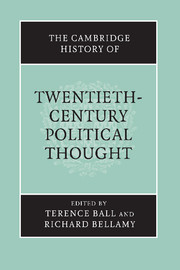Book contents
- Frontmatter
- Editors’ introduction
- Part I The changing fortunes of liberal democracy
- 1 The coming of the welfare state
- 2 Politics and markets: Keynes and his critics
- 3 The advent of the masses and the making of the modern theory of democracy
- 4 Nationalism and imperialism
- 5 Fascism and racism
- 6 Conservatism
- 7 Christian democracy
- 8 Critics of totalitarianism
- 9 The end of the welfare state?
- Part II Varieties of Marxism
- Part III Science, modernism and politics
- Part IV New social movements and the politics of difference
- Part V Beyond Western political thought
- Biographies
- Bibliography
- Subject index
- Name index
- References
3 - The advent of the masses and the making of the modern theory of democracy
from Part I - The changing fortunes of liberal democracy
Published online by Cambridge University Press: 28 March 2008
- Frontmatter
- Editors’ introduction
- Part I The changing fortunes of liberal democracy
- 1 The coming of the welfare state
- 2 Politics and markets: Keynes and his critics
- 3 The advent of the masses and the making of the modern theory of democracy
- 4 Nationalism and imperialism
- 5 Fascism and racism
- 6 Conservatism
- 7 Christian democracy
- 8 Critics of totalitarianism
- 9 The end of the welfare state?
- Part II Varieties of Marxism
- Part III Science, modernism and politics
- Part IV New social movements and the politics of difference
- Part V Beyond Western political thought
- Biographies
- Bibliography
- Subject index
- Name index
- References
Summary
‘There are in fact no masses; there are only ways of seeing people as masses’ .
(Williams 1971 [1958], p. 289)The gradual extension of the suffrage to all adult men and ultimately women too during the late nineteenth and early twentieth centuries transformed the politics of Western Europe and North America. Many contemporary theorists attributed these reforms not to any improvement in ordinary people’s political judgement because of better education and higher living standards, nor to a progressive appreciation of the right of all adults to be considered full citizens, but to a new social and economic reality having made such measures unavoidable. Quite simply, within a mass society political power could only be exercised with mass support. In spite of the inevitability of a widened franchise, many theorists believed deep tensions existed between the concepts of the ‘mass’ and ‘democracy’, rendering a ‘mass democracy’ almost a contradiction in terms. For the ideas of the ‘masses’ and ‘mass society’ were embedded within accounts of social organisation and behaviour that challenged the models of individual agency and rationality traditionally associated with democratic decision-making. Consequently, even democratically minded thinkers found that a coherent conception of mass democracy required a radical rethinking of the norms and forms of the democratic process (Femia 2001). This chapter traces the development of the new sociological and psychological languages of mass politics and their deployment in the construction of a modern theory of democracy. As we shall see, though still widely accepted, this theory incorporates empirical and normative assumptions arising from contentious and anachronistic views of human nature and society few would wish to espouse today.
- Type
- Chapter
- Information
- The Cambridge History of Twentieth-Century Political Thought , pp. 70 - 103Publisher: Cambridge University PressPrint publication year: 2003
References
- 11
- Cited by

